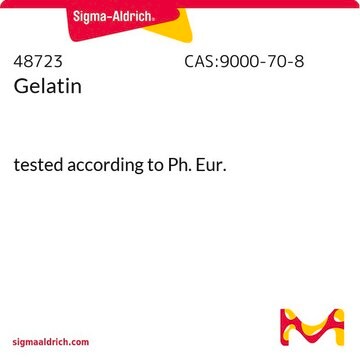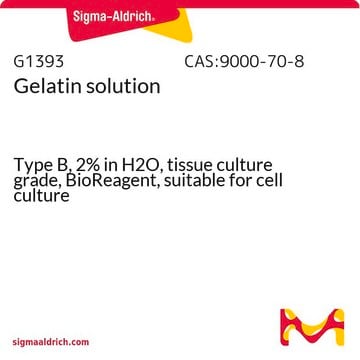G2625
Gelatina from porcine skin
gel strength ~175 g Bloom, Type A
Sinónimos:
Teleostean gelatine
About This Item
Productos recomendados
origen biológico
Porcine skin
tpo
Type A
formulario
powder
concentración
65-85% (biuret)
técnicas
cell culture | mammalian: suitable
solubilidad
H2O: soluble 50 mg/mL
¿Está buscando productos similares? Visita Guía de comparación de productos
Aplicación
Gelatin has been used in many applications. It has use in coating cell culture to improve attachment of cells, being added to PCR to stabilize Taq DNA, as a blocking reagent in Western blotting, ELISA, and immunochemistry, and as a component of media for species differentiation in bacteriology. As a biocompatible polymer, it has used as a delivery vehicle for release of active biomolecules and in generation of scaffolds for tissue engineering applications. In the pharmaceutical industry, geltan can be used as a suspending and encapsulating agent, among other applications.
Componentes
Precaución
Nota de preparación
Código de clase de almacenamiento
11 - Combustible Solids
Clase de riesgo para el agua (WGK)
nwg
Punto de inflamabilidad (°F)
Not applicable
Punto de inflamabilidad (°C)
Not applicable
Equipo de protección personal
Eyeshields, Gloves, type N95 (US)
Certificados de análisis (COA)
Busque Certificados de análisis (COA) introduciendo el número de lote del producto. Los números de lote se encuentran en la etiqueta del producto después de las palabras «Lot» o «Batch»
¿Ya tiene este producto?
Encuentre la documentación para los productos que ha comprado recientemente en la Biblioteca de documentos.
Los clientes también vieron
Artículos
Discussion of synthetic modifications to gelatin, improving the three-dimensional (3D) print resolution, and resulting material properties.
Nuestro equipo de científicos tiene experiencia en todas las áreas de investigación: Ciencias de la vida, Ciencia de los materiales, Síntesis química, Cromatografía, Analítica y muchas otras.
Póngase en contacto con el Servicio técnico










